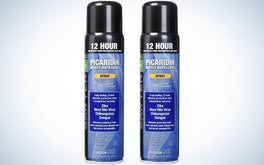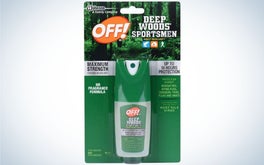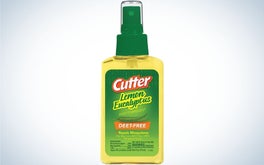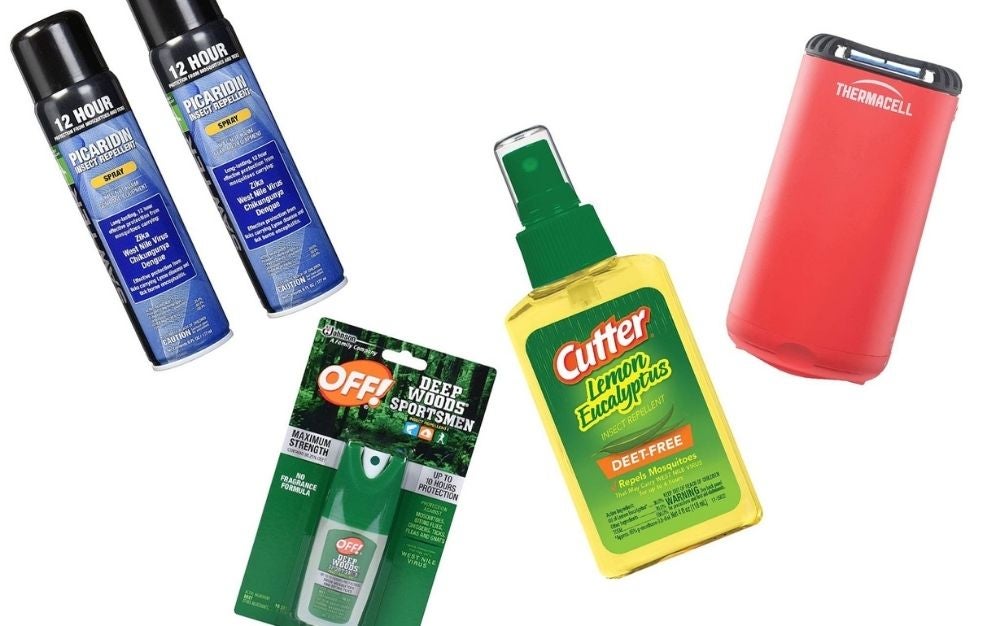| Best Mosquito Repellent for Skin |

|
Sawyer Picaridin Insect Repellent | SEE IT |
LEARN MORE
|
Summary
Sawyer’s Picaridin is a synthetic version of a chemical derived from pepper plants and is safe for the entire family, even pregnant women. |
| Best Mosquito Repellent for Camping |

|
OFF! Deep Woods Sportsmen | SEE IT |
LEARN MORE
|
Summary
DEET is a very effective mosquito repellent, and this high-concentration formula packs a lot of punch for its one-ounce size. |
| Best Natural Mosquito Repellent |

|
Cutter Lemon Eucalyptus Insect Repellent | SEE IT |
LEARN MORE
|
Summary
Cutter insect repellent comes from the leaves of the lemon eucalyptus tree and is a safe alternative for those wanting to avoid DEET or other insecticides. |
We may earn revenue from the products available on this page and participate in affiliate programs. Learn more ›
How well a mosquito repellent works is the primary consideration. It must keep mosquitoes away from your body, or away from a particular area such as a campsite or backyard, as efficiently as possible for as long as possible.
There are two primary methods: topical lotions and airborne repellents. You may need to apply repellent to exposed skin areas in some situations, such as when hiking, or you may need to provide large-scale repellent during a gathering, such as a cookout. Personal preference matters here, too, because you may want to use a natural mosquito repellent—though many aren’t as effective as manufactured repellents (even though many are perfectly safe).
Along with effectiveness is cost. You may feel that it’s not worth spending a lot of money in exchange for an hour or two on the patio and would rather simply stay inside. But if you’re camping, you can’t spend all your time in a tent, so you’ll have to invest in a quality repellent.
Let’s take a look at the best mosquito repellents on the market today, their pros and cons, and the situations for which they’re best suited.
- Best Overall: Sawyer Picaridin Insect Repellent
- Best for Camping: OFF! Deep Woods Sportsman
- Best Natural: Cutter Lemon Eucalyptus Insect Repellent
- Best Repellent Device: Thermacell Patio Shield
Things to Consider Before Buying Mosquito Repellent
There are various factors to consider when choosing the best mosquito repellents, including efficacy, method, and cost. Start here and include our other buying considerations in your shopping process to ensure you can keep the bugs away on any adventure.
Effectiveness and Ease of Use
The best mosquito repellent is of no use if you find it difficult to apply or employ. For instance, while a Thermacell device is simple to use, you’ll have to replace the repellent mats and fuel cartridges occasionally. Consider your intended use before you buy anything.
Are you going camping or backpacking?
Do you need it to be moisture resistant?
Should it be safe for pets and kids?
The application and ingredients both impact the efficiency and effectiveness of the insect repellent or repellent device. The environment and the types of bugs you are trying to repel will also fall under this category. Certain ingredients work best for mosquitoes whereas other ones will be more effective for noseeums or ticks. Get to know what is in the insect repellent instead of just opting for the cheapest or a name brand.
Sometimes a mosquito spray alone will not cut it, and you’ll need to use a tent or a bug net. Add to your arsenal of camping gear and review our list of the best family camping tents.
Other Pests
If you also may encounter biting flies and ticks, buy a product that will work well against those pests in addition to mosquitoes. Even though natural mosquito repellents are pretty effective, they may not work as well on other types of insects. The ingredients should be listed on the canister, and reputable brands will disclose which kinds of bugs they repel.
Wearing clothing that covers your skin or even having clothing treated with bug repellents can help eliminate the risk of being bitten by various insects. Other types of devices or mosquito repellent for yards like citronella candles or torches can also help.
Applicability
How easy a mosquito spray is to apply can influence the overall effectiveness. If you want something that you can apply to your clothes, you’ll likely want something different than if you are looking for something you can apply to your face.
While applying lotion to your skin is very efficient, it takes time, and you won’t be able to apply it well or at all to clothing. Aerosol products are better for overall coverage, but to cover your face, you’ll need to spray it on your hands and then apply.
Best Overall: Sawyer Picaridin Insect Repellent
Why it Made the Cut: Picaridin is incredibly effective at repelling a range of insects, from mosquitoes to biting flies and more. It is non-greasy and won’t damage clothing.
Key Features
- Size: 6 ounces
- Active ingredient: Picaridin
- Form: Aerosol spray
Pros:
- Lasts up to 12 hours against mosquitoes
- Fast and easy to apply
- Picaridin is more effective than DEET against biting flies
Cons:
- Spray can feel oily on the skin
Sawyer has been a leading developer of mosquito repellents since 1984. Picaridin is one of the longest-lasting repellents available. The spray version will protect against mosquitoes for upwards of 12 hours. While lotions may last a little longer, sprays can be applied to clothing and skin, giving you better overall protection, and it’s faster and easier to apply. It has a low odor that dissipates as the spray evaporates.
Sawyer’s Picaridin is a synthetic version of a chemical derived from pepper plants and is safe for the entire family, even pregnant women. It is 20 percent more effective than DEET against biting flies. It is also quite safe to use on clothing and gear. While it should be reapplied after swimming, it will otherwise offer all-day protection against mosquitoes and other pests.
Best for Camping: OFF! Deep Woods Sportsmen
Why it Made the Cut: With no fragrance and over 98% DEET, this spray will last about 10 hours and is extremely effective against biting insects, especially mosquitoes.
Key Features
- Size: 1 ounce
- Active ingredient: DEET
- Form: Pump spray
Pros:
- Lightweight and very effective
- Odorless, fragrance-free product
- Protects for up to 10 hours
Cons:
- DEET can damage some plastics
DEET is a very effective mosquito repellent, and this high-concentration formula packs a lot of punch for its one-ounce size. The bottle is small and light enough to keep in your pocket or pack, and the pump spray dispenser allows you to easily apply it to skin and hair, with little to no wasted overspray. It’s perfect for taking along hiking or camping because it won’t take up much space or weigh you down.
DEET repels mosquitoes and is very effective against chiggers, ticks, fleas, and biting flies, giving you a wide range of protection from just a single application. Many users rave about its effectiveness worldwide, including jungle environments where the bugs can be truly brutal. Be careful, though, as it can stain some fabrics. DEET also doesn’t play nice with some plastic materials, so it is best to restrict application to skin, hair, and non-plastic clothing.
Best Natural: Cutter Lemon Eucalyptus Insect Repellent
Why it Made the Cut: The active ingredient, oil of lemon eucalyptus, is recommended by the CDC as a safe and effective insect repellent. It is effective and has a pleasant odor.
Key Features
- Size: Four ounces
- Active ingredient: Oil of lemon eucalyptus
- Form: Pump spray
Pros:
- Cool lemon eucalyptus scent
- Easy to apply to skin and clothing
- Effective for up to six hours
Cons:
- Doesn’t last as long as DEET or Picaridin
The active ingredient of Cutter comes from the leaves of the lemon eucalyptus tree and is a safe alternative for those wanting to avoid DEET or other insecticides. With a 30% concentration, it is effective against mosquitoes for about six hours before reapplication may be necessary. It isn’t greasy or sticky and has a pleasant scent. It’s also an effective tick repellent. While you should always do a fabric test in an inconspicuous location first to be certain, it should be safe for all clothing and not leave stains or residue.
To apply, spray it directly on clothing and exposed skin, then rub with your hands to spread it evenly. Don’t spray it directly on your face. Instead, spray your hands and then apply to your face. When stored in cool, dark, dry conditions, it should remain viable for several years.
Best Repellent Device: Thermacell Patio Shield
Why it Made the Cut: With its flame-free design, this Thermacell area repellent is safe for use anywhere. It doesn’t emit smoke or odor, but provides a very effective 15-foot area of protection against mosquitoes. It’s a great mosquito repellent for patio use.
Key Features
- Dimensions: 3.4 x 3.4 x 6.5 inches
- Active ingredient: Allethrin
- Fuel capacity: 12 hours
Pros:
- Flame and smoke-free
- No sprays or chemical wipes
- Provides a large zone of protection when in use
Cons:
- Uses proprietary repellent mats as well as fuel cells that need to be replaced
- Should not be used around food
Thermacell devices create a mosquito-free zone in a backyard or campsite by vaporizing allethrin, a repellent derived from the chrysanthemum flower. Simply insert one of the repellent mats, turn on the fuel, and let the Thermacell work. It keeps mosquitoes away from a 15-foot area. Each unit comes with three mats (4 hours each) and one 12-hour fuel cell. Refill mats and fuel cells are available.
A Thermacell device is ideal for entertaining outdoors or at a campsite or outdoor recreation area. It emits no offensive odors or open flames. It’s safe for use around children. It’s toxic to fish, so keep it away from any backyard koi ponds. Do not use around cats, either. Turn the unit off and let the repellent dissipate for a few minutes before bringing out food.
How We Made Our Picks
I live in the upper Midwest, and in the summer months, the mosquitoes are copious, large, and hungry. People here have learned through hard-won experience which mosquito repellents work and which don’t.
For this guide, I evaluated the products based on several factors, including:
- Efficacy. The product simply must keep mosquitoes away.
- Duration. Having to reapply a product again and again throughout the day is frustrating and wasteful. Twice a day, unless you’re washing it off in some way, should be enough.
- Safety. Although DEET’s use has been implicated in seizures among children, the Environmental Protection Agency “believes that the incident data are insufficient to establish DEET as the cause of the reported effects” and has approved DEET for use. (In any event, DEET should be kept off children’s hands to avoid ingestion.) We evaluated products with and without DEET to provide a choice.
- Value: I sought affordable products that will keep mosquitoes away.
FAQs
Q: How can I avoid getting bitten by mosquitoes?
In addition to using a high-quality repellent, there are a few things you can do to help reduce your risk of mosquito bites. First, try to stay cool. Mosquitoes are attracted to you more when you’re sweaty. Around the house, reduce or eliminate standing water because that’s where mosquitoes lay eggs. They are most active during sunrise and sunset, so staying indoors during those times will also help.
Q: Which is the most effective mosquito repellent?
There is no one-size-fits-all solution. DEET is an extremely effective topical repellent but can harm plastics. Picaridin, another topical repellent, provides an excellent level of protection. A repellent device, such as a Thermacell, is a great choice for campsites and backyard gatherings.
Q: Does Vicks Vapor Rub repel mosquitoes?
While this isn’t a manufacturer-approved use of Vicks VapoRub, anecdotal evidence indicates some people have found it to help reduce the frequency of mosquito bites. It is believed that mosquitoes dislike strong smells, and thus they tend to avoid Vicks Vapor Rub. Some people claim that rubbing it on a mosquito bite reduces or eliminates the itch.
Q: Is there a way to permanently
keep mosquitoes away?The only way to permanently get rid of mosquitoes is to eliminate standing water. Female mosquitoes lay their eggs in standing water, and their larvae hatch in standing water. So, if you want to eliminate or reduce the number of mosquitoes on your property, eliminate as much standing water as possible. This may include buckets of water or water in ditches and gutters
Q: How effective are mosquito
repellents?How effective mosquito repellents are depends on the ingredients and application methods. There is some debate about wearable devices like bracelets being ineffective or devices and candles being safer because you’re not applying them to your skin. There are not as strict regulations around potentially dangerous ingredients like DEET in insect repellents, as higher concentrations tend to be more effective despite the health and environmental risks. Wearing clothing covering your skin and using mosquito netting is more effective, but some repellents may still help.
Final Thoughts
If we had to narrow our choice for the best mosquito repellent to a single product, it would be the Sawyer Picaridin Insect Repellent. The active ingredient, Picaridin, is just as effective as a mosquito repellent as DEET, without being as harsh of a chemical. It is odorless and has a clean feel on the skin. Still, personal preference and intended use may influence which type of repellent you use and if our top pick is the best option for you.




